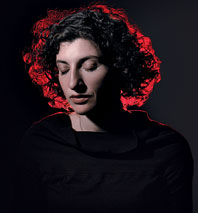
On a busy corner in Times Square, a young woman of indeterminate ethnicity stands and waits for the light to change. On her back, she wears a big yellow pack. In her hand, she holds an MP3 player’s tiny volume control. A thin wire dangles between the controller, which has been rewired to act as a detonator, and the backpack, which contains a bomb. When the light turns green, she’ll press the button.
The obvious question is Why? Brooklyn’s Julia Loktev, the 37-year-old writer-director of this almost unbearably tense scene in Day Night Day Night, disagrees. “Come on—any idiot can imagine why somebody might become a suicide bomber in Times Square,” she says, noting that she’s not imagining anything the NYPD—or any New Yorker—hasn’t already worried about. “We all read newspapers. We know this.”
More to the point, we’ve already seen this. More than five years after September 11, there’s diminishing shock value in imagining an attack on New York. We’ve seen earnest tributes and heroic docudramas, labyrinthine pop terror plots (24 and The Unit), metaphorical monsters (The Host), and doomsday fantasies (Battlestar Galactica, Heroes). The post-9/11 eulogy era ended last summer with World Trade Center, while publishing houses, art houses, and cable networks have ramped up a trickier subgenre of stories (Sleeper Cell, Paradise Now) that attempt to get inside the minds of terrorists. (See Don DeLillo’s latest novel, a review of which can be found here.) Day Night Day Night could be the first hybrid of the next generation: It clicks along as a minimalist, white-knuckle thriller (scarier than 24 because of the banality and plausibility of its premise) but hits hardest as a portrait of a young bomber’s crisis of faith.
For Loktev, not turning the movie into some sort of easily grasped morality tale was crucial. “In most movies—and this is true in independent films as much as it is in big studio productions—there are always clues, and there’s always The Lecture,” she says. “To take a terrible example: I just saw The Holiday on the plane. Early on, you find out that Cameron Diaz hasn’t cried since her parents got divorced and you know she’s going to cry by the end of the movie and you’re going to get that speech—well, indie American films follow that same logic: They refer to some childhood trauma, some reason, and by the end there’s the redemption, the overcoming, the understanding. Everything is explained.”
Loktev previously directed the intimate but unsentimental 1998 documentary Moment of Impact, about the aftermath of an automobile accident that left her father severely brain-damaged and bedridden. Her video installation Rough House is currently at the Brooklyn Museum’s “Global Feminisms” show. (“It’s basically an examination of a relationship between a man and a woman who beat each other up,” says Loktev. Why is it feminist? “The woman gives as good as she gets.”) Naturally, she has no truck with middlebrow Hollywood. (“Biopics are the scourge of quality cinema,” she snipes. “They take up all the space now.”) But her new film was inspired by her dissatisfaction with another sort of biographic narrative: journalistic accounts of female Palestinian and Chechen suicide bombers. “Reporters tended to pathologize them: This girl couldn’t get pregnant. A boyfriend broke up with this girl,” she says. “Well, I know a lot of girls who couldn’t get pregnant who didn’t become suicide bombers. I wanted to subvert these regular expectations in terms of pop psychology.”
She explains that she set out to strip away the personal backstories and particular political platforms that others might emphasize. What’s left, then? Simple, specific moments in the 48 hours before the bomber’s attack: the girl cutting her toenails, eating pizza, dressing, fumbling with an AK-47. Not surprisingly, some critics have called this a colossal cop-out. (For David Edelstein’s review, click here.)
“The thing that I become very angry about is that people say my film denies a political or religious context to the act,” says Loktev. “She obviously doesn’t just do this for the hell of it.”
Other critics resent Loktev’s decision not to give her woman a particular ethnicity or accent. (She auditioned 650 women before she settled on first-time actor Luisa Williams, also from Brooklyn and a former employee of nymag.com.) “At a screening, one woman stood up and said, ‘I have a very hard time finding this story realistic, because the character doesn’t have an accent,’” Loktev says. “Well, none of the London bombers had accents”—just British ones.
When writing her script, Loktev says, she cut away so many familiar facts that she became fascinated with what was left—odd details that somehow seemed more universal: how the male organizers often debated the proper attire for female bombers. How a Palestinian woman accidentally detonated her bomb too early, after browsing in a shoe shop.
“One Chechen girl in Moscow blew up a truck bomb by running it into a convoy, but before she did, she stopped and bought some bananas,” explains Loktev. “I thought, It’s not about the truck bomb, it’s the bananas.” Or the pretzel. In Day Night Day Night, Williams stands in front of the Duane Reade on 42nd Street, eating one. With mustard.